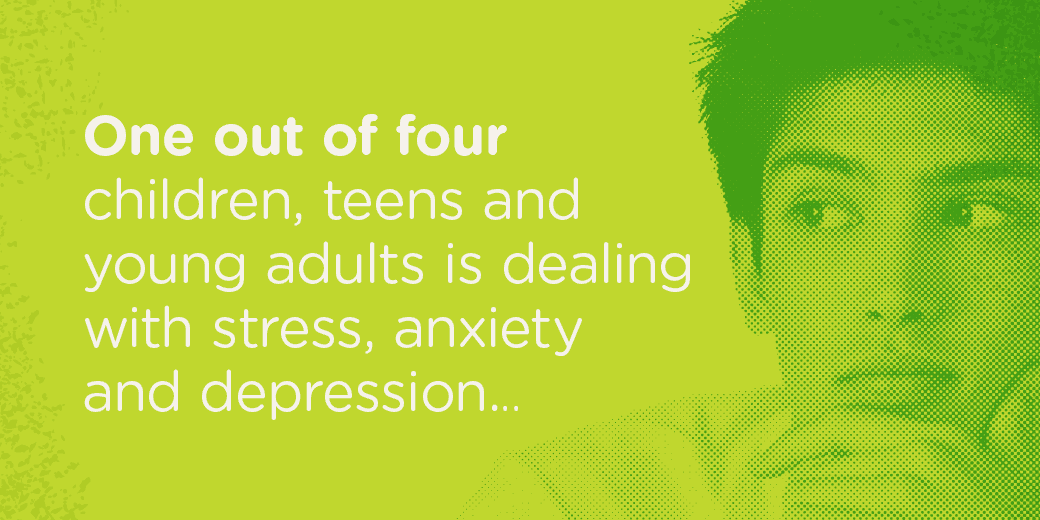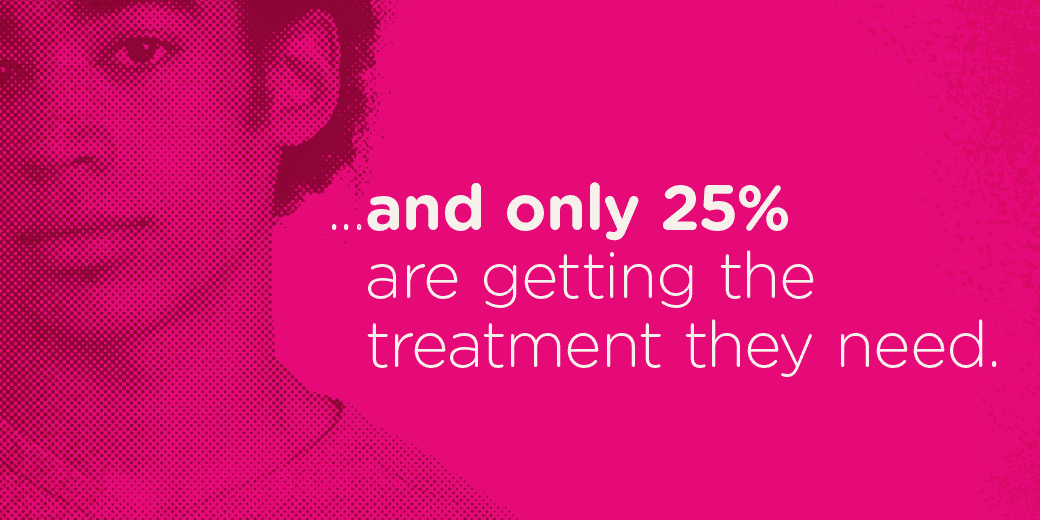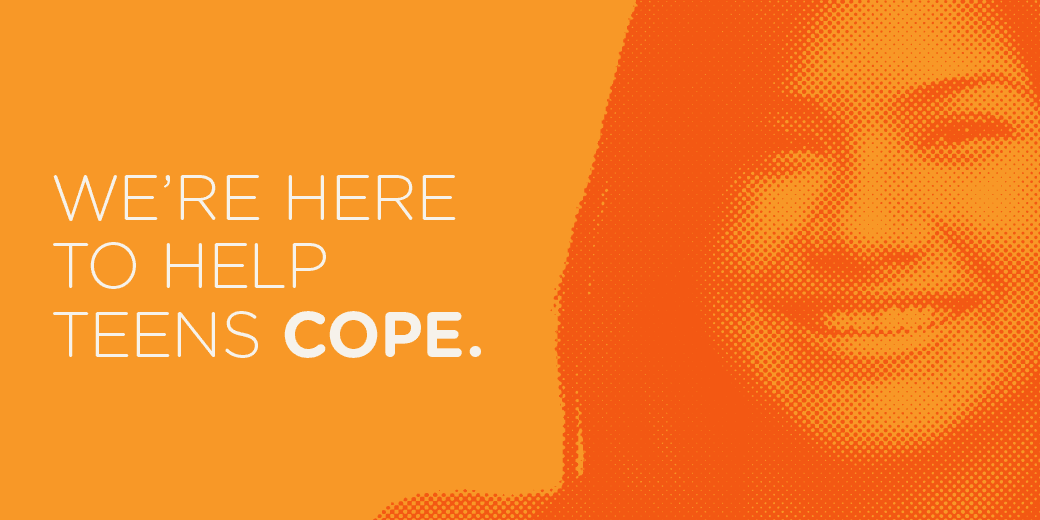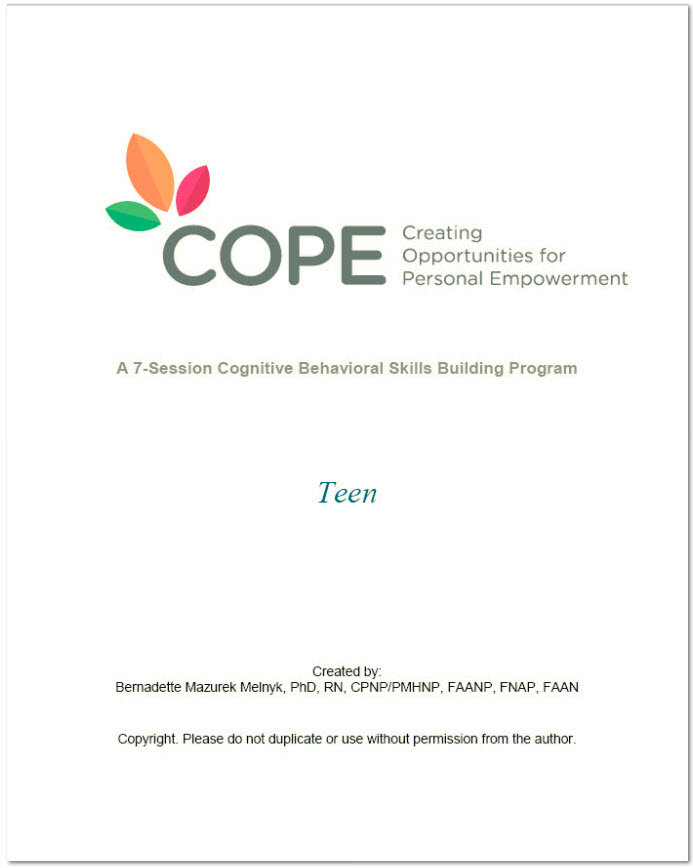Evidence-based CBT-Based Programs for Children, Teens, Young Adults/College Students, Adults, Pregnant Woman, and the Healthcare Workforce. COPE Can Be Delivered in Primary Care Practices, Primary and Secondary Schools, Universities, Healthcare Systems, and Community Centers
MindBodyStrong for the healthcare workForce Now Available!
New: COPE for Pregnant Stressed, Anxious and Depressed Women NOW AVAILABLE!
COPE For Cancer Patients/Survivors Coming Soon!
When faced with stress, depression and anxiety, everyone needs help to COPE
New: Faculty Train-the-Trainer Program Now Available for Nurse Practitioner, Health Sciences and Social Work Faculty: For more information, contact cope.melnyk@gmail.com
Our Cognitive Behavioral Therapy-based (CBT) programs are evidence-based and designed to help children, teens, young adults and adults cope with anxiety, stress and depression by teaching them how to develop the skills needed to stop negative or unhelpful thoughts and start thinking, feeling and behaving in more positive ways. Learning that you can’t always control what happens, but you can control the way you respond to what happens, is very empowering. Over 20 studies during a 30 year time span support that COPE reduces anxiety, depression and stress as well as improves self-esteem, healthy behaviors and academic performance.
The evidence-based 7-Session manual-based instructor-delivered program provides support for children, teens, young adults and adults using brief, easy-to-follow sessions, complete with skills-building activities, that convey that there is hope for change, and that both depression and anxiety can be improved by learning the skills taught in COPE.
An online self-directed program is available for teens (11-18).
The evidence-based 15-Session COPE Healthy Lifestyles TEEN (Thinking, Emotions, Exercise, and Nutrition) manual-based program builds upon the skills learned in the 7-Session Teen Program by including sessions on healthy nutrition and physical activity, helping teens to engage in healthy lifestyle behaviors, improve their self-esteem, cope with stress, and lessen anxiety and depressive symptoms.
Dr. Bernadette Mazurek Melnyk, PhD, APRN-CNP, EBP-C, FAANP, FNAP, FAAN
Creator of the COPE programs, CEO and Founder of COPE2Thrive
Parents, High Schools and Primary Care Practices
Special Discount on the Digital On-line Interactive Program for Teens $89.00
Help teens learn how to cope with stress, anxiety, and depression as well as learn critical life skills to lead happy, productive and healthy lives.
Additional large quantity discounts are available for program purchases of over 100 digital on-line interactive teen programs. Contact us for more information.
IMPORTANT NEWS UPDATES
New COPE Provider News
NAMI Eastside is applying a $25,000 grant to support and expand programs for teens to understand and protect their own mental health, and also recognize when a peer is in crisis. The grant will help NAMI expand its Youth Ambassador Program from 45 students to more than 200 in 2023. NAMI also will offer the Cope2Thrive Program to school faculty to help youth and adults address their mental health in a positive way, according to the release."
NEW: COPE MANUAL-BASED PROGRAM, INSTRUCTOR/FACILITATOR PROGRAM OVERVIEW
Bernadette Melnyk, COPE Program Creator and Founder of COPE2Thrive.
Dr. Melnyk is a nationally/internationally recognized author, speaker, practitioner, researcher, and expert in child and adolescent health, evidence-based practice, and intervention research. Bern has over 600 publications, including a book entitled A Practical Guide to Child and Adolescent Mental Health Screening, Early Intervention, and Health Promotion (3rd edition) (2022). New York, NY: Springer Publishing and NAPNAP.
Bern's ultimate goal is to get COPE into the hands of every child, teen, young adult and adult who suffers from stress, depression, anxiety, or other mental health disorders that keep them from living a happy, healthy, full life as well as to deliver the program to all children and youth to prevent mental health problems and enhance healthy lifestyle behaviors.
CLICK HERE TO JOIN OUR QUICKLY-GROWING GLOBAL NETWORK OF SCHOOLS AND MORE THAN 2,000 HEALTH PROFESSIONALS PROVIDING THE EVIDENCE-BASED COPE PROGRAMS TO PATIENTS AND STUDENTS IN K-12 SCHOOLS AND UNIVERSITIES.
U.S. Teen Girls Experiencing Increased Sadness and Violence
“According to new CDC data, nearly 3 in 5 (57%) U.S. teen girls felt persistently sad or hopeless in 2021—double that of boys, representing a nearly 60% increase and the highest level reported over the past decade. While all teens reported increasing mental health challenges, experiences of violence, and suicidal thoughts and behaviors, girls fared worse than boys across nearly all measures. The new report also confirms ongoing and extreme distress among teens who identify as lesbian, gay, bisexual, or questioning (LGBQ+). “High school should be a time for trailblazing, not trauma. These data show our kids need far more support to cope, hope, and thrive,” Debra Houry, M.D., M.P.H., CDC’s Chief Medical Officer and Deputy Director for Program and Science. “Proven school prevention programs can offer teens a vital lifeline in these growing waves of trauma.”’
“With these alarming increases, we need preventive and early evidence based interventions. COPE can help as it has demonstrated its efficacy in decreasing depression, anxiety and suicidal thoughts as well as improving healthy behaviors and academic performance in over 20 studies. -Bern Melnyk
It's Midterms: How Do I De-stress?
Although teen students face many struggles in school life, one issue is unanimous: stress. For many teens, test anxiety and worries about grades dominate their life. However, it doesn't need to be this way! There are many ways to use evidence-based coping skills when it feels like you're drowning in work. It's especially important to take care of your mental health. Using the ideas presented in COPE is a great place to start!
Attack those Negative or Unhelpful Thoughts With Positive Ones
“Often times when we are anxious about a test, we start having thoughts like "I can't do this," or "This test is impossible." Sound familiar? Instead, start saying to yourself, "I can do this," or "I will do my best to get a good grade." As soon as negative or unhelpful thoughts start creeping in, immediately combat them with a positive thought. According to Mayo Clinic, "When your state of mind is generally optimistic, you're better able to handle everyday stress in a more constructive way."” https://www.theteenmagazine.com/it-s-midterm-time-how-do...
JAMA Pediatrics: November 21, 2022
Association of Youth Suicides and County-Level Mental Health Professional Shortage Areas in the US
"In this cross-sectional study of 5034 US youth 5 to 19 years who died by suicide from 2015 to 2016, the suicide rate increased as county levels of mental health professional shortages increased, after adjusting for county demographic and socioeconomic characteristics." https://jamanetwork.com/.../jamape.../fullarticle/2798887... Our interactive 7-Session Teen Online Educational Program is designed to be easily accessible from a computer, laptop, tablet, or Wi-Fi-connected smartphone. Skills learned can be used to modify their emotions during their teen and future adult years. The programs teach techniques for coping with stress and anxiety from common stressors and stress-related symptoms. Empower your teens with the skills and concepts they need to recognize and manage negative emotions and think in more positive ways. The program is perfect for serving rural populations of teens who do not have access to adequate mental healthcare resources. Please forward this to any family and friends that might benefit from our programs. https://www.cope2thrive.com/order-form-online-program
Demand for Mental Health Care Has U.S. Psychologists Overwhelmed: Survey.
https://consumer.healthday.com/outpatient-psychiatric.... "U.S. psychologists are struggling to meet the growing demand for help with mental health issues as the COVID pandemic continues. Young people, especially 13- to 17-year-olds, represented the largest increases in seeking care. Many psychologists also saw a need for more care in kids under 13 and among 18- to 25-year-olds." COPE can help. Our Cognitive Behavioral Therapy-based (CBT) programs are evidence-based and designed to help children, teens and young adults deal with anxiety, stress, and depression by teaching them how to develop the skills needed to stop negative or unhelpful thoughts and start thinking, and feeling and behaving in more positive ways. Over 20 studies support that COPE reduces anxiety, depression, and stress as well as improves self-esteem, healthy behaviors, and academic performance.https://www.cope2thrive.com/
"Study finds ‘huge’ increase in children going to the emergency room with suicidal thoughts; The study found that visits to the ER with suicidal thoughts increased 59% from 2016-17 to 2019-21. There was a corresponding increase in cases in which suicidal ideation was the principal diagnosis, which rose from 34.6% to 44.3%. Hospitalizations for suicidal thoughts increased 57% between fall 2019 and fall 2020."
https://www.cnn.com/.../suicide-er-visits-kids/index.html
COPE can help. Comment from Dr. Bernadette Melnyk (developer of COPE): "COPE is helping to shift the paradigm from one of crisis intervention for suicidal thinking to one of early intervention and prevention by equipping children, teens and young adults with cognitive-behavioral/coping skills that they can use for the rest of their lives to cope with life stressors successfully."
COPE is the evidence-based solution to preventing and treating mental health problems in youth in this Hot off the press Commonwealth Fund report:
https://www.commonwealthfund.org/publications/2022/jul/filling-gaps-access-mental-health-treatment-teens-and-young-adults?utm_source=alert&utm_medium=email&utm_campaign=Improving+Health+Care+Quality
COPE2Thrive is mentioned under Telehealth Services in the article!
The Centers for Disease Control and Prevention is warning of an accelerating mental health crisis among adolescents, with more than 4 in 10 teens reporting that they feel “persistently sad or hopeless,” and 1 in 5 saying they have contemplated suicide, according to the results of a recent published survey.” See
https://www.washingtonpost.com/education/2022/03/31/student-mental-health-decline-cdc/
Cognitive-behavioral therapy is the gold standard first-line treatment for mild to moderate depression and anxiety. Supported by numerous published studies, the evidence-based COPE cognitive-behavioral therapy-based program builds mental health resiliency and coping skills while reducing depression, anxiety, stress, and enhancing healthy lifestyle behaviors in adolescents, young adults and children. A digital 7-session online version of COPE for teens is available at a cost of $89 compared to $100 to $200 for one therapy session according to a 2019 report by SimplePractice, a practice management system for mental health professionals”
https://www.forbes.com/health/mind/how-much-does-therapy-cost/#footnote_1
Shortcuts for Specific Users
Select this option if you are a parent seeking an easily-accessible, self-delivered, cognitive behavioral therapy-based online educational program to help your teenagers learn cognitive behavioral skills for coping with stress, anxiety and depression using an internet-connected home-based computer.
Select this option if you are a primary care practice, healthcare professional, primary care provider, social worker, mental health counselor or other professional seeking to become an instructor and deliver the manual-based program/s to your patient/s suffering from stress, anxiety and depression.
Select this option for school teachers, university faculty/staff, counselors, school nurses, administrators and other professionals seeking to become instructors and deliver the manual-based program/s to your students suffering from stress, anxiety and depression, as well as to promote their mental health.
LEARN
Seven or 15 easy-to-navigate manual or online CBT-based sessions teach the skills necessary to help deal with problems and emotions, set goals, and feel happier, healthier and more positive every day.
PRACTICE
By practicing new skills taught in COPE, writing about personal experiences, and working to find solutions to problems, children, teens and young adults are encouraged to change the way they think, act and behave.

















